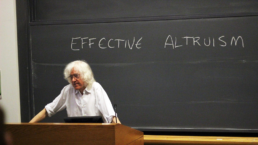The gonzo ethics of seeking to make gobs of money so you can give it away.
by Robert Reich
Today is Giving Tuesday — a day to focus on personal charitable giving to worthy causes.
But what I really want to talk about today is something quite different from charitable giving, although often confused with it: It’s called “effective altruism.” Known as EA to its practitioners, effective altruism urges people to give away a large share of their incomes.
Fine as far as it goes. But EA has been going much further.
One of EA’s most influential proponents is the Oxford philosopher William MacAskill, who has urged young people to seek high-paying jobs in finance (or wherever else they can make gobs of money) on ethical grounds, because they can then donate a large portion of their earnings to worthy causes. For example, by becoming a hedge-fund mogul, MacAskill says, you can donate large sums — and create far more good — than you can as a social worker.

Or to take a different example, MacAskill argues that a young person concerned about the world’s poor could become a doctor in a poor country and possibly save the equivalent of 140 lives in their medical career. But if they took a job that paid them hundreds of millions of dollars, and then donated a big portion of it intelligently, they could save ten times as many lives.
Sounds logical. But wait.
MacAskill’s utilitarian logic leaves out the social costs associated with how a talented young person might make gobs of money in the first place. (One red flag: Elon Musk claims that MacAskill’s giving philosophy is similar to his own.)
Recent Posts
“Arrest Now, Ask Questions Later”: Why Did L.A. ICE Agents Arrest and Jail U.S. Citizen Andrea Velez?
July 3, 2025
Take Action Now “They didn’t have vests that said ICE or anything. Their cars didn’t have license plates. … Just because of the color of our…
Trump’s Big, Beautiful Bill Is Naked Class War
July 3, 2025
Take Action Now Trump’s “Big, Beautiful Bill” trades tax cuts on millionaires for the dissolution of society.By Hamilton Nolan, In These Times…
Mayor Mamdani’s First Day, A Zero Hour Conversation With Richard Wolff
July 2, 2025
Take Action Now If elected, what would Mayor Mamdani do on his first day in City Hall? How would a democratic socialist govern as a big-city mayor?……
The U.S. Is Funding A Bloodbath At Gaza Aid Centers
July 2, 2025
Take Action Now The admin just gave $30M to GHF, the organization at the center of charges that Israel is weaponizing assistance and shooting at…




